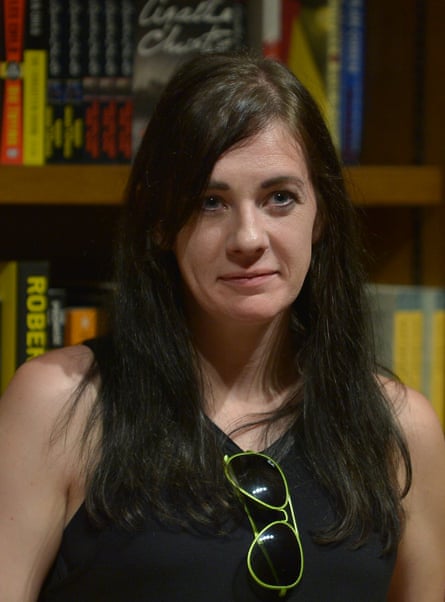The bestselling American fantasy novelist Maggie Stiefvater is leading a chorus of writers warning readers that if they download pirated ebooks, then authors will not be able to continue writing because they will be unable to make a living.
Stiefvater, author of the Shiver and Raven Cycle series, raised the issue after she was contacted on Twitter by a reader who told her: “I never bought ur books I read them online pirated.” On her website, Stiefvater later explained that, when ebook sales for the third book in the Raven Cycle – Blue Lily, Lily Blue – “dropped precipitously”, her publisher decided to cut the print run of the next book in the series to less than half of its predecessors.
“This is also where people usually step in and say, but that’s not piracy’s fault. You just said series naturally declined, and you just were a victim of bad marketing or bad covers or readers just actually don’t like you that much,” wrote Stiefvater, who had seen fans sharing pdfs online and was “intent on proving that piracy had affected the Raven Cycle”. So she and her brother created a pdf of The Raven King, which consisted of just the first four chapters, repeated, and a message explaining how piracy affected books.

“The effects were instant. The forums and sites exploded with bewildered activity. Fans asked if anyone had managed to find a link to a legit pdf. Dozens of posts appeared saying that since they hadn’t been able to find a pdf, they’d been forced to hit up Amazon and buy the book. And we sold out of the first printing in two days.”
Stiefvater revealed that she is now writing three more books set in the Raven Cycle world, but that the new trilogy “nearly didn’t exist because of piracy”. “And already I can see in the tags how Tumblr users are talking about how they intend to pirate book one of the new trilogy for any number of reasons, because I am terrible or because they would ‘rather die than pay for a book’,” she wrote. “As an author, I can’t stop that. But pirating book one means that publishing cancels book two. This ain’t 2004 anymore. A pirated copy isn’t ‘good advertising’ or ‘great word of mouth’ or ‘not really a lost sale’.”
According to the Intellectual Property Office’s latest study of online copyright infringement, 17% of ebooks read online are pirated – around 4m books.
Ebook piracy is “a very significant issue and of great concern” to publishers, said Stephen Lotinga of the Publishers Association, which works to take down and block pirated ebooks links and sites. “As an industry we’ve not had the situation that the music and film industries have gone through,” Lotinga said. “But that obviously is 4m ebooks that authors and publishers aren’t getting paid for, and should be getting paid for, and it’s a particular worry for publishers at a time when ebook sales are slightly in decline.”
Last week, a poll on piracy from Hank Green, the brother of the bestselling novelist John Green, was responded to by more than 35,000 people. Just over a quarter (26%) said they had pirated books in the past, while 5% said they currently pirate books.
Samantha Shannon, author of the Bone Season series, said that attempting to stay on top of pirated editions of her books was “a Sisyphean task”. “I think all authors experience it to some degree, unfortunately. It’s a reality of modern publishing,” she said. “I don’t often look for pirated copies of my books, as I find it too dispiriting, but I do batch-send links to my publisher now and again in the hope that they can remove some of them.”
Shannon wrote on Twitter that “the thing that’s really exhausting about piracy is that authors are often not allowed to be upset by theft of their work. If we ask people not to do it, no matter how courteously, we’re told we should have more compassion or be grateful we even have readers. Outside the creative industry, people broadly dislike theft. Within the creative industry, it becomes a grey area where people aren’t sure.”
“Authors who ask you not to pirate are not attacking people who are too poor to afford books, or people who genuinely can’t access libraries,” wrote Shannon – but Lotinga at the Publishers Association said that those people were not often the perpetrators. Ebook pirates “tend to be from better-off socio-economic groups, and to be aged between 31 and 50-something. “It’s not the people who can’t afford books,” he said. “It’s not teenagers in their rooms.”
Novelist Laura Lam wrote on Twitter: “I’m personally not bothered by the small percentage of readers who pirate because they have no access to books any other way. But of readers, I think that’s a small percentage. I’m more heartbroken by those who can easily afford books but pirate anyway. Any sales lost via those readers will have a very real impact on my career.”
According to a survey carried out by the Authors Licensing and Collecting Society, the median income of a professional author in 2013 was £11,000, a drop of 29% on 2005.
Lam said that she had a trilogy cancelled through her first publisher three weeks after book two came out. “That’s an instance where if even a couple hundred had pirated instead of buying, it had repercussions. Long-term, that publisher went bankrupt and I re-sold it to my new publisher, but it was still a challenge at the time. Not everyone gets a second chance.”
Fantasy novelist Tom Pollock said that readers needed to be “aware of the consequences of pirating … In an economy based on market signals, the signal being sent if people pirate rather than buy or borrow is: ‘Nobody wants this’.”
He added: “There’s an argument that you sometimes see that ‘a download is not equal to a lost sale, because that person wouldn’t have bought it anyway’, and there’s varying evidence on that, but it’s very much a static analysis of a dynamic problem, because if you normalise the practice of pirating books, you erode incentive for people to pay for them, so eventually, people who would have bought them stop doing so.”

Comments (…)
Sign in or create your Guardian account to join the discussion